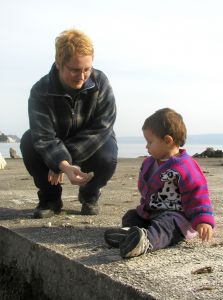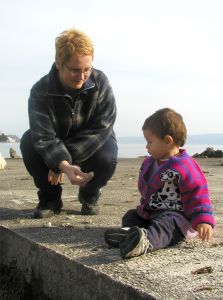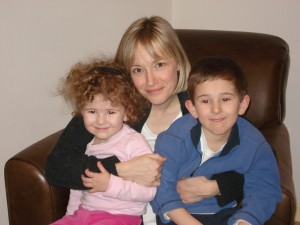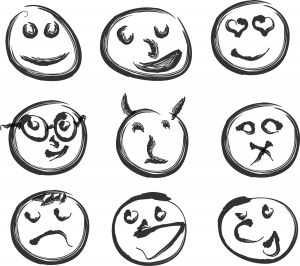By Rita Brhel, managing editor and attachment parenting resource leader (API)
 Through Attachment Parenting, we learn how truly powerful a close emotional relationship with our children can be. But even with the strongest of bonds, conflict will arise between parents and their children. As children grow, AP focuses more and more on how we, as parents, resolve conflict — in a gentle, positive manner that promotes influence, guidance, and teaching rather than control.
Through Attachment Parenting, we learn how truly powerful a close emotional relationship with our children can be. But even with the strongest of bonds, conflict will arise between parents and their children. As children grow, AP focuses more and more on how we, as parents, resolve conflict — in a gentle, positive manner that promotes influence, guidance, and teaching rather than control.
Much of the root of conflict resolution resides in our own selves – in dealing with our own unresolved hurts and biases, as well as finding personal balance, so that we can control the urge to jump to conclusions and react without thinking. And so that we can have the courage to stop in the moment, take a deep breath, and think about how to control our default thinking to be able to react with compassion instead of anger and defensiveness.
Another important piece of this puzzle is understanding how personality differences play into both conflict and conflict resolution. Think about what is most likely to create conflict between you and your spouse or partner: Often, isn’t it because you two do the same thing in different ways? My husband and I encounter this all the time. I am much more detail-oriented than my husband and sometimes don’t understand why he doesn’t see the crumbs on the table, while he wonders why I care so much about the crumbs. The same situation can happen between you and a child who doesn’t see the world in the same way.
Personality Assessments as a Way to Get to Know Your Child Better
The point of discovering your child’s personality traits is not to put a label on him, or to try to compartmentalize the reason behind his actions. Instead, it is another way for parents to get to know their child more — to discover what makes him tick. Continue reading When ‘D’ Meets ‘S’: The Role of Personality in Parenting
 Nutritional deficiencies in mothers can affect her mental health and lead to inconsistent patterns of mother-child interactions, which in turn increases the likelihood of creating an insecure attachment between the mother and child.
Nutritional deficiencies in mothers can affect her mental health and lead to inconsistent patterns of mother-child interactions, which in turn increases the likelihood of creating an insecure attachment between the mother and child. From API’s Publications Team
From API’s Publications Team A study to be published in the March issue of Behavior Therapy, “Generalized Anxiety Disorder: Connections with Self-Reported Attachment,” credits secure parent-child attachment in lessening the risk of that child eventually developing a severe anxiety disorder as an adult.
A study to be published in the March issue of Behavior Therapy, “Generalized Anxiety Disorder: Connections with Self-Reported Attachment,” credits secure parent-child attachment in lessening the risk of that child eventually developing a severe anxiety disorder as an adult. Your child is naturally imaginative — all children are. Most theories of child development view young children as highly creative, with a natural tendency to fantasize, experiment, and explore their physical and conceptual environment.
Your child is naturally imaginative — all children are. Most theories of child development view young children as highly creative, with a natural tendency to fantasize, experiment, and explore their physical and conceptual environment. Dear Readers,
Dear Readers,
 A study published in the Development Pyschobiology journal involving the care of orphaned chimpanzees could help change the way human orphans are cared for.
A study published in the Development Pyschobiology journal involving the care of orphaned chimpanzees could help change the way human orphans are cared for. Custody cases are rarely pleasant, but in about 10 percent of these cases, it truly becomes a battle between the estranged parents and the long-term effects on their children’s mental wellbeing can be devastating.
Custody cases are rarely pleasant, but in about 10 percent of these cases, it truly becomes a battle between the estranged parents and the long-term effects on their children’s mental wellbeing can be devastating. A University of Maryland study shows that, more than marriage, involving the father during the prenatal period leads to a stable family life.
A University of Maryland study shows that, more than marriage, involving the father during the prenatal period leads to a stable family life.